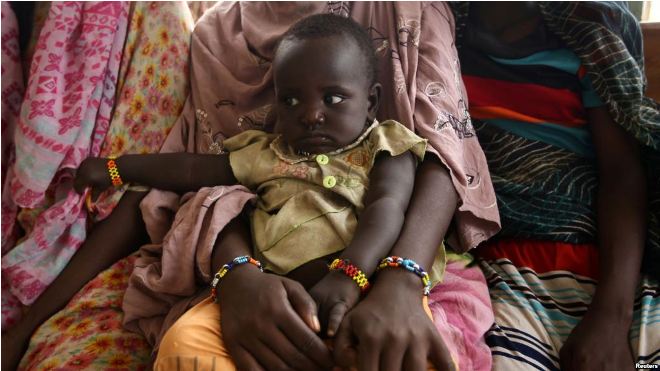
Friday July 14, 2017

FILE - A woman holds her child as they wait to receive treatment in Kobo health center in Kobo village, one of the drought stricken areas of Oromia region, in Ethiopia, April 28, 2016.
For 12 years, Médecins Sans Frontières (MSF) has worked in Ethiopia's Somali region, providing medical care during droughts, floods and other types of emergencies that made food scarce and left people hungry.
But MSF, also known as Doctors Without Borders, says it has never seen malnutrition levels spike so high in the region as during the current drought. Thousands of acutely malnourished children have been admitted to hastily-established feeding centers in hopes of staving of starvation and death.
MSF reports that 68 children suffering from severe malnutrition died in the Somali region's Doolo zone last month despite receiving care at the organization's clinics.
"Everywhere in the world, the children under five years of age are always the most vulnerable, and they're the ones that always succumb to disease and malnutrition first," says Tara Newell, an MSF emergency coordinator.
Uphill battle
MSF, along with the Ethiopian government and other aid agencies, is trying to prevent more kids from dying but they face an uphill battle against a drought that began last year and is predicted to run until early 2018.
From March until May – the rainy season in the Horn of Africa - large parts of Somalia, Ethiopia and Kenya experienced less than 70 percent of usual cumulative rainfall, according to FEWS NET, the Famine Early Warning Systems Network.
In many parts of the Horn, rainfall totals in 2017 have hit 36-year lows.
The drought has had a devastating effect on the region's nomadic communities. Without rain, crops have dried up and livestock have died, depleting food supplies and disrupting livelihoods. Without clean water, disease has spread. Acute watery diarrhea, cholera and measles have affected thousands.
Aid dwindling
The U.N. World Food Program and other aid agencies have responded, but growing need and funding shortfalls are undercutting their efforts. An estimated 7.8 million Ethiopians are in need of humanitarian aid, an increase of more than 2 million since the start of the year.
The WFP has warned that its food stocks could run out this month, and that even with immediate new funding, assistance won't reach those who need it most until August or September.
That may be too late for many Somali region residents who have used up all of their resources, says MSF's Newell.
"A vast majority of the livestock has already died," Newell said. "Things don't change overnight. Even with massive rains in the coming weeks, it doesn't change the situation of malnutrition because the livestock take a long time to rebuild in those communities, and people need food now."